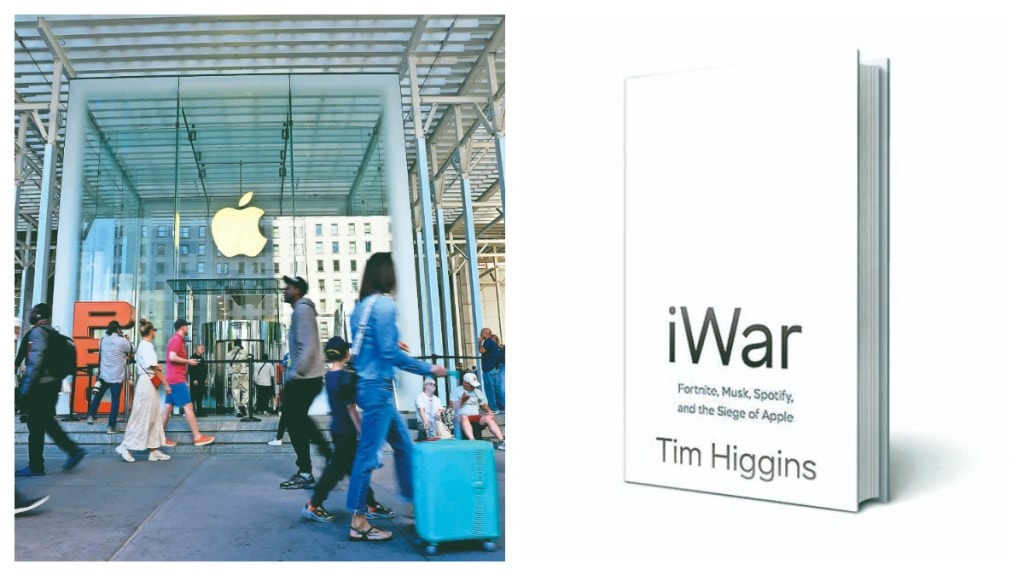By Srinath Sridharan
When you read iWar: Fortnite, Musk, Spotify, and the Siege of Apple, you are stepping into a story about how one company built the most formidable ‘economic-fortress of the digital age’, and about the restless coalition that has gathered to bring a side of those walls crashing down. Tim Higgins, a seasoned business reporter for The Wall Street Journal, sets out to show you how Apple became the world’s most valuable company, and then introduces you to the lawmakers, regulators and entrepreneurs who took on its might.
From the invention of the iPhone and the App Store, Apple has not only reshaped commerce but also influenced culture and conversations and, increasingly, the flow of ideas. What began as a beautifully designed device soon became the centre of a global ecosystem. The App Store, once thought of as a neat addition to the iPhone, turned into an economic miracle.
Developers rushed to participate. Consumers embraced the convenience. Apple took its 30% commission and discovered, almost by accident, one of the most profitable business models of all time. It was so successful that the company came to rely on it heavily, and with reliance came the temptation to squeeze. Over the years Apple extended its fees, hardened its rules and tightened its grip on partners and customers alike. It is this tightening that provoked rebellion. Higgins paints the scene vividly. You see the challengers not as a single unified army but as a loose alliance of the discontented.
Tim Sweeney of Epic Games is there, brash and willing to provoke a courtroom showdown by deliberately breaking Apple’s rules in Fortnite. Daniel Ek of Spotify is more careful, but equally determined, mobilising evidence and public opinion against Apple’s practices. Pony Ma of Tencent appears in the background, with WeChat representing a rival universe that Apple cannot easily dominate. Elon Musk hovers at the edges, stirring debate with his familiar mixture of provocation and self-interest. This cast of characters makes the book read almost like a drama of modern power politics, except the battleground is the device in your hand.
Higgins takes you inside Spotify’s campaign. You follow the company as it orchestrates an A/B test through its Android app to gather evidence for regulators. The results are striking. Millions of users, the company showed, were lost in the self-serving subscription process imposed by Apple’s rules. Millions more endured what the European Commission later called an inferior experience. With this data in hand, Spotify was able to persuade Margrethe Vestager, then the European Commissioner for Competition, that Apple’s model was suffocating opportunity for others.
Epic’s rebellion, in contrast, unfolded in spectacular fashion. By introducing its own payment system into Fortnite, the company baited Apple into a response. Apple duly obliged, ejecting the game from its store and triggering one of the most closely watched lawsuits of the decade. Higgins presents the courtroom as a stage where the future of digital commerce is debated in real time. Through filings and testimony you come to see how Apple justifies its policies as essential to security and user trust, and how Epic counters by accusing Apple of monopoly. Higgins makes you feel their weight: decisions that will shape how digital economies function for billions of users.
WeChat’s presence in the book is a reminder that this is not just a Western drama. In China, Apple faces a super-app so deeply embedded in daily life that even Apple cannot fully dictate the rules. Higgins uses this to illustrate the limits of Apple’s power and to hint at a future where the company may be challenged not only by Western regulators but also by entirely different digital ecosystems rising elsewhere.
Higgins also reminds you that Apple’s grip was not only challenged from the outside but quietly questioned within. Executives like Phil Schiller once floated the idea of lowering App Store fees once the business reached certain profit thresholds, a proposal that vanished even as margins soared to levels so high that Apple could have remained wildly profitable at half the commission. The book also widens the frame beyond Cupertino, showing how Google, once the more open alternative, gradually mirrored Apple’s practices and adopted its own version of the so-called ‘app tax’.
These threads matter, because they reveal the siege of Apple is part of a larger story about platform power itself, not just the behaviour of one company. The book reads as a chronological account of overlapping efforts by developers, competitors and regulators to resist what they see as anti-competitive practices.
Together they form a mosaic of dissent. The theme that emerges is clear. Apple’s genius in creating the iPhone and App Store has been matched by its hunger to control and to profit. That hunger has pushed it into practices that look increasingly like monopoly. You may already know many of the details if you follow technology news. The 30% commission, the lawsuits, the regulators in Brussels and Washington—none of these are secrets. The book does not deliver stunning new revelations. Given the scale of Big Tech’s ambitions and the persistence of investigative journalism, it is hard to imagine that this will be the last word on the subject. A sequel, in a few years, feels almost inevitable.
This is, in the end, a fascinating and at times unsettling book. It reminds you of the sheer might of BigTech and of how difficult it is for governments to protect citizens in a digital economy that already frames every choice we make. American regulators, as Higgins shows, often stepped lightly around their own giants, leaving EU to take the harder stand and build the painstaking cases that put consumer protection at the centre. For India, the question for us to ponder is whether our regulators will ever show the same resolve.
The book is not just about devices and code. It is about human behaviour, about the pursuit of wealth, supremacy and control. You will come away with greater respect for Apple’s achievements, but also with a sharper sense of how dominance can curdle into arrogance. The book is riveting as a whole, though in places it drags if you have already followed the antitrust battles that have dogged BigTech in recent years. Yet it remains a fascinating compilation, but not a page turner. It is, however, a sobering reminder that we are all fee-paying consumers in digital prisons of our own making. What we mistake for choice is often only the illusion of it.
Srinath Sridharan is an author, corporate adviser & independent director on corporate boards
iWar: Fortnite, Elon Musk, Spotify, WeChat, and the Siege of Apple’s Empire
Tim Higgins
Torva
Pp 352, Rs 999








